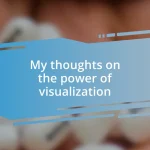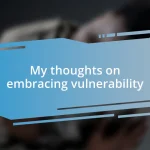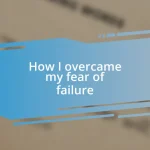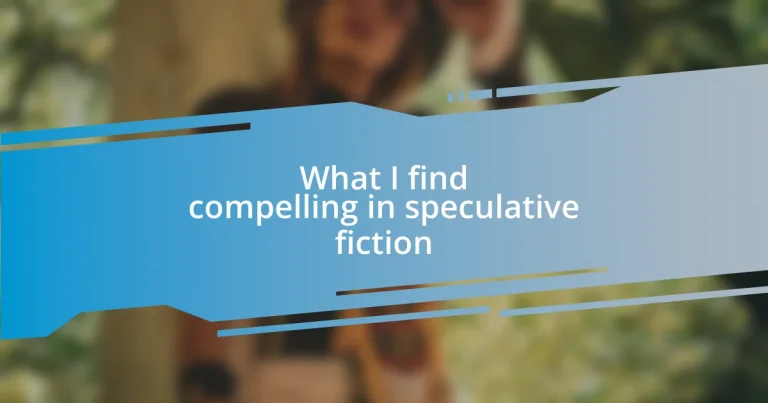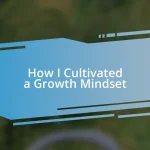Key takeaways:
- Speculative fiction reflects societal anxieties and aspirations, inviting readers to explore themes such as identity, moral dilemmas, and the relationship between technology and ethics.
- Character development in speculative fiction often involves profound transformations, as characters face unique challenges that evoke empathy and encourage self-reflection.
- Emotional resonance is a crucial element in speculative storytelling, allowing readers to connect deeply with characters’ experiences of loss, hope, and existential fears.
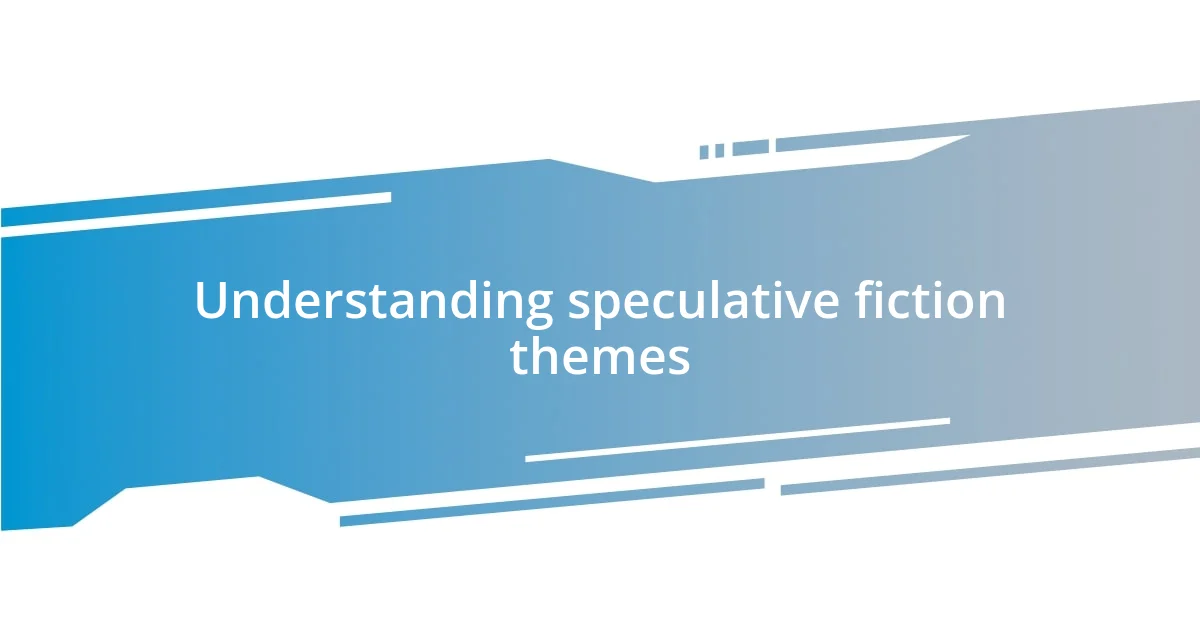
Understanding speculative fiction themes
Speculative fiction invites us to ponder themes that stretch beyond our reality, often reflecting societal anxieties or aspirations. I remember reading “The Dispossessed” by Ursula K. Le Guin and feeling a jolt when I realized how seamlessly her exploration of anarchism versus capitalism mirrored conversations happening in our world. Isn’t it fascinating how a fictional universe can echo our own dilemmas?
When I delve into speculative fiction, I’m often drawn to the moral quandaries it presents: what happens when technology surpasses our ethical boundaries? This question lingered in my mind after finishing “Neuromancer” by William Gibson. It made me reconsider our relationship with technology and whether we’re steering it or allowing it to steer us.
Themes like identity and otherness frequently emerge, sparking an emotional connection that resonates deeply within readers. I felt incredibly seen while reading “Kindred” by Octavia Butler, as it raised questions about heritage and the complexities of race through time travel. How do our past experiences shape our present realities? This interplay of time and identity is something speculative fiction does so well, encouraging us to examine not only the world around us but our place within it.
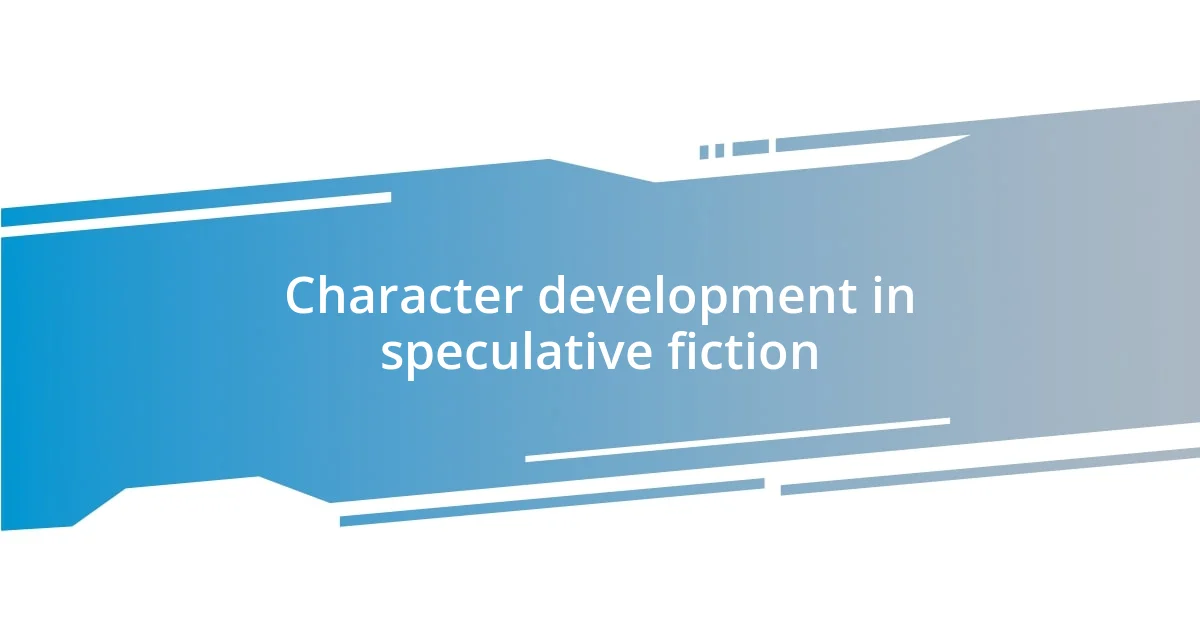
Character development in speculative fiction
Character development in speculative fiction is often remarkable due to the unique challenges and settings that force characters to evolve. I remember being captivated by the growth of the protagonist in “The Left Hand of Darkness” by Ursula K. Le Guin. The journey from isolation to understanding and empathy was not just about survival in an alien environment; it echoed my own experiences of stepping outside my comfort zone. Have you ever found yourself in a situation that changed your perspective completely?
Moreover, speculative fiction often places characters in moral dilemmas that reveal their true selves. For instance, in “The Hunger Games” by Suzanne Collins, Katniss Everdeen’s journey transforms her from a reluctant participant into a fierce leader willing to fight against oppression. I felt an intense connection to her struggle, as it reflected the internal battles we all face when forced to confront unjust systems. It raises the question: how do we find courage in the face of overwhelming odds?
One aspect that excites me the most is how speculative fiction allows for radical character transformations. In “The Fifth Season” by N.K. Jemisin, the characters grapple with their identities in a world that perceives them as dangerous outsiders. As I immersed myself in their struggles, I couldn’t help but reflect on my own feelings of alienation. It’s powerful how these narratives can evoke deep empathy by showcasing characters who resonate with our own challenges in understanding and acceptance.
| Aspect | Speculative Fiction |
|---|---|
| Character Growth | Characters often evolve in unexpected ways, shaped by unique environments and circumstances. |
| Moral Dilemmas | Leads characters to confront ethical challenges, unveiling their true nature. |
| Identity Exploration | Delves into themes of belonging and acceptance, often mirroring real-world issues. |

Exploring moral dilemmas in narratives
When I immerse myself in speculative fiction, I’m often struck by the complexity of moral dilemmas faced by characters. Take “The Handmaid’s Tale” by Margaret Atwood, for instance. The central character, Offred, navigates a world where her autonomy is stripped away, forcing her to make heart-wrenching choices about survival versus resistance. It made me reflect on my own values and how far I might go to preserve my identity in the face of societal oppression.
- Moral dilemmas create tension and engagement, prompting readers to question their own beliefs.
- Characters often wrestle with choices that have significant ethical implications, leading to profound character development.
- Narratives challenge us to consider the consequences of our actions within the fabric of society, influencing our understanding of right and wrong.
In darker tales such as “The Road” by Cormac McCarthy, the stark moral landscape compels us to confront the human condition at its rawest. The father-son bond in a post-apocalyptic world raises questions about loyalty and sacrifice. I remember feeling a deep, unsettling connection to their plight, as it mirrored my thoughts on familial bonds and the lengths one will go to protect loved ones. This intense exploration of moral ambiguity is what keeps me returning to speculative fiction—each story becomes a lens through which I can reflect on my own ethical boundaries.
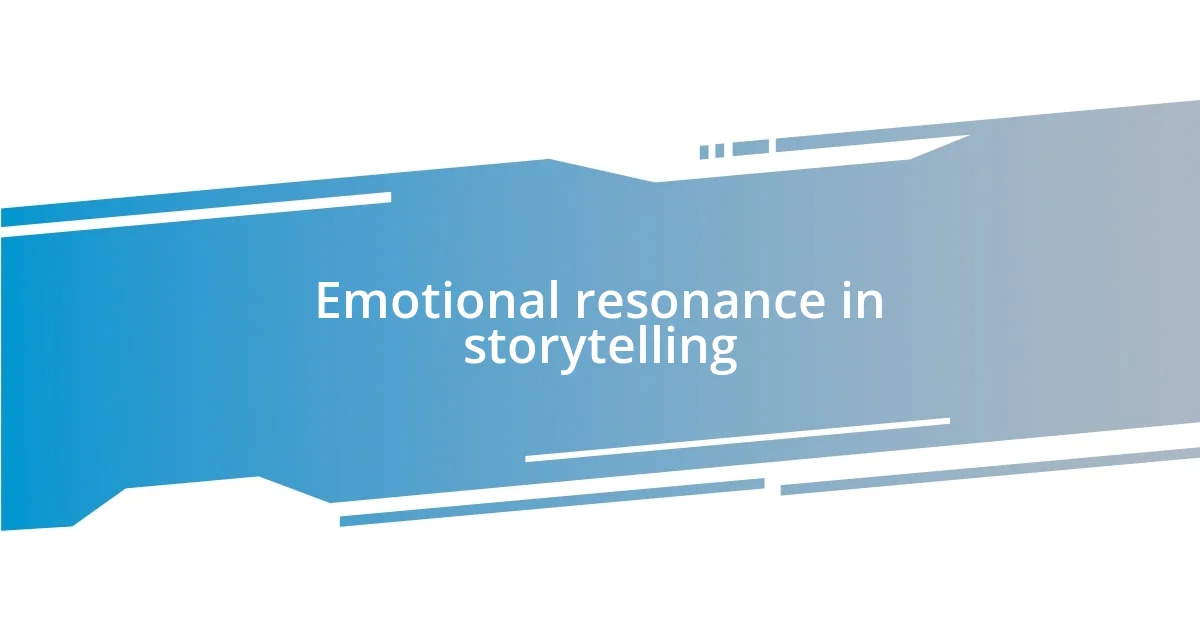
Emotional resonance in storytelling
It’s fascinating how emotional resonance is woven throughout storytelling, especially in speculative fiction. I often find myself deeply moved by characters who endure extraordinary situations, which evoke responses I didn’t expect. For instance, in a novel like “Station Eleven” by Emily St. John Mandel, the juxtaposition of beauty and despair captures this emotional depth perfectly. When I first read it, the scenes of a post-apocalyptic world intertwined with moments of art and connection struck a chord with me. It made me ponder: how do we find meaning in chaos?
What truly anchors me in these stories is how they evoke genuine feelings of loss and hope. In “An Absolutely Remarkable Thing” by Hank Green, the protagonist grapples with rapid fame and the alienation that accompanies it. I resonated with her internal struggle; it reminded me of times when I felt distant from myself after a major life change. Isn’t it remarkable how these narratives can transform our understanding of ordinary human experiences into something profound?
Ultimately, it’s the way speculative fiction elevates our emotional landscapes that captivates me. The characters’ journeys often mirror our own battles against existential fears. I remember feeling a sense of catharsis while reading “The Night Circus” by Erin Morgenstern, where the competition impacts not just the characters but also the essence of love itself. Reflecting on my relationships during those moments brought a rush of nostalgia. Isn’t it amazing how fiction can articulate our untold fears and desires, creating a space for healing through shared experience?

Recommendations for compelling reads
I often find myself drawn to stories that ignite my imagination and challenge my understanding of reality. One such recommendation is “The Fifth Season” by N.K. Jemisin. This novel not only weaves a gripping tale but also reveals the intricacies of oppression and survival in a beautifully crafted world. I felt a deep connection to the characters’ struggles against societal injustices, which made me introspective about our own world’s challenges. How often do we overlook the extraordinary resilience that emerges from adversity?
Another gem that has captured my heart is “Snow Crash” by Neal Stephenson. The fast-paced adventure mixed with sharp societal commentary made me appreciate the way speculative fiction can reflect our current technological anxieties. I remember being utterly absorbed by the protagonist, Hiro, as he navigated a digital landscape that felt eerily similar to our own evolving online world. Have you ever considered how fiction can foreshadow real-world implications in such thrilling ways?
Lastly, I cannot recommend “The Left Hand of Darkness” by Ursula K. Le Guin enough. It beautifully explores themes of gender and is a masterclass in world-building. I was fascinated by the characters’ fluid identities and how those concepts pushed me to reflect on my perceptions of gender norms. This novel made me question: why are we so resistant to exploring ideas that challenge our preconceived notions? It’s these thought-provoking explorations within speculative fiction that resonate with me long after I’ve turned the last page.



